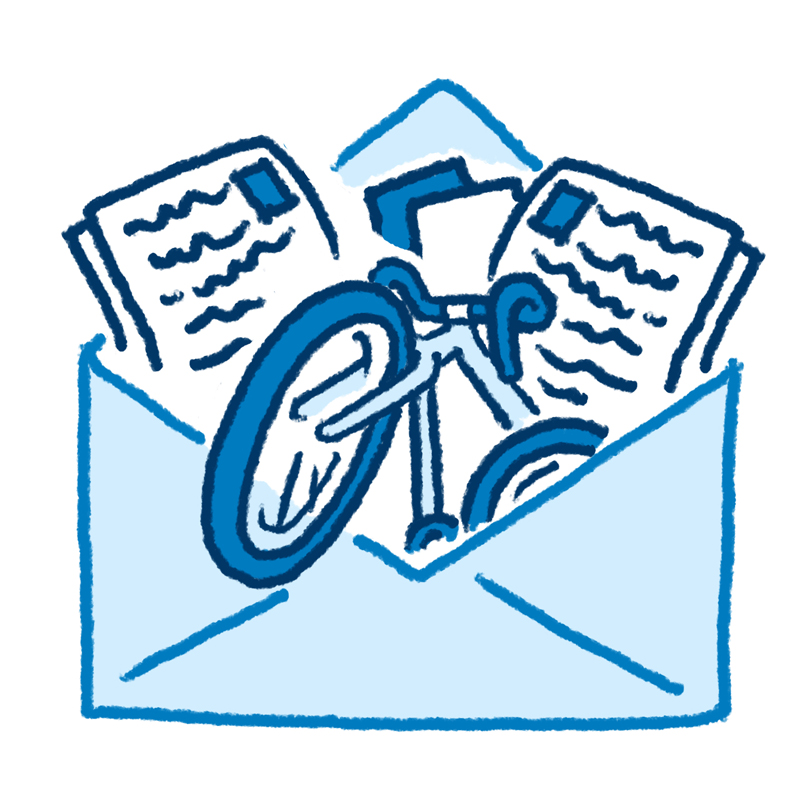Basket Case
This essay originally appeared in the August/September 2020 issue of Adventure Cyclist magazine.
Alfalfa is, amazingly, asleep in his basket. I can see his head resting on its wooden edge. His eyes are closed. He is lulled by smooth pavement. A semi-truck roars by, but he keeps sleeping. I stare at the white line and make it my life’s work to stay on it. I try to relax my shoulders. We are riding down Highway 40 on an alternate route off Adventure Cycling’s Great Divide Mountain Bike Route, approaching Kremmling, Colorado.
“It’s only six miles on the highway,” Bob, a sleek 50-something cyclist had told us earlier that day. He had pulled over when he saw our packed bicycles lying on their sides. Tyler, Alfalfa, and I were tucked away in the willows of a riverbank, exhausted.
Alfalfa is a blue heeler. He belongs to Tyler, and he will soon be two years old. This is an important age for Alfalfa because it’s when people say a blue heeler becomes the best dog they have ever had.
Upon seeing Bob, Alfalfa braced himself. Tyler told him to calm down. Bob went on over the sound of Alfalfa’s barking, “There is no shoulder, which sucks, but the climb out of Radium is rough. It’s a road like this, but there are all these trucks with boat trailers coming up at 60 mph. I must have eaten a pound of dust.”
We decided not to go down into Radium. I don’t like eating dust. Turns out I don’t like riding on highways either. I watch Tyler’s bike lean into each screaming car as if magnetized by its mass. One truck passes us while there is oncoming traffic. Tyler is close enough to touch the truck or at least reach like Michelangelo’s Adam for the passenger’s hand, which emerges from the window. But the highway holds no such gesture — the hand instead turns up its middle finger.
Alfalfa rouses as we roll into town, blinking sleepily from his basket. We stop at the mercantile. I wobble off my bike and say, “Never again — on a road like that — never again.” Tyler buys a watermelon and cuts it open on the table outside. We’re soon laughing at everything. We’re going to buy eggs for breakfast. We’re safe.
But under the table stews a little blue dog.
Alfalfa, who slept fat-faced and contented within inches of flying metal, has now drawn an invisible circle around our happy little table. He sits within the circle with an evil eye. This is not the first time we’ve disagreed as to what necessitates concern. Alfalfa barks at old people looking at old trains. He barks at cyclists passing on the left. He goes ballistic around cows and doesn’t care for people who hug in public.
Tyler goes back into the mercantile for the eggs. I’m dimly aware of an old woman around the corner who has been smoking a cigarette. She approaches our table and must have stepped into the invisible circle. The explosion at my feet is immediate. The woman grabs her chest and scuttles past. She says, “My word.” I say, “I’m so sorry.”
This is Alfalfa’s life — ever vigilant, ever worried.
You have to wonder what he thinks. Alfalfa had been living the last nine months on a horse farm in New Jersey. He galloped through the fields he’d been named for. He swam in cool, dark ponds. Then he crossed the country in a white van packed with all of Tyler’s belongings. He left the van and its plush, feather duvets in an outdoor storage facility in Craig, Colorado. He wedged himself into a Prius stuffed with panniers and framebags and two disassembled Surlys. That Prius disappeared into an almost-too-short storage locker in Steamboat Springs. Then the final straw — he got shoved into a basket on a bike headed south along the Great Divide.
“I don’t remember asking him if it was okay,” Tyler said of Alfalfa’s new way of life.
A word about the basket: Tyler made it. He makes everything. The basket is wooden and trapezoidal, with the wider end on top, and runs the length of his handlebars. It shines with marine varnish. It sits above a 20in. wheel mounted on a fork and platform that Tyler and his friend welded up from an old BMX frame. Tyler’s sleeping pad is strapped on the side of it. On the other side is a cheap poncho that doubles as a bit of padding for Alfalfa’s chin. Hanging from a carabiner is our bright orange poop shovel, a metal choke collar, a handmade collapsible dog bowl, and Tyler’s dusty, beaten-up baseball cap. Lining the basket is a dog bed — custom, of course — and fitted to the bottom.
Alfalfa has an unusual relationship with the basket. Mostly it’s a place where he reveals his deepest worries via whimpers and barks.
The Steamboat Springs-to-Salida section of the GDMBR is a decent route for dogs. There isn’t much traffic. There are good stretches of dirt roads. This is important because Alfalfa is happiest on the ground. He can keep pace during the ascents at an easy walk, and he trots on the flats. He is attached by a leash to Tyler’s right side, through the leather belt, because “he rips right through belt loops.”
It is different on the downhill stretches. Although I am sure he would try, Alfalfa can’t keep pace with us down mountain passes. Into the basket he goes. And, unless he is exquisitely exhausted, Alfalfa whines or barks incessantly on his throne. Down the Lynx Pass, down the Ute Pass, down the Boreas Pass, Alfalfa is, in short, a basket case. He shifts side to side to peer back at me through Tyler’s armpit. His movements pitch the bike back and forth. He wails.
There’s a running joke that Alfalfa is Tyler’s anxiety dog, and it’s Alfalfa who has the anxiety.
I’m anxious too. Where are we going to stop for the night? How far is it now to “Informal Campground #7?” Is Tyler going to blow his knee out? How about Alfalfa’s limp? Can dogs take ibuprofen, or is that the one that kills them? Am I falling in love with my friend? I wasn’t supposed to do that. Where is my Chapstick?
And then there’s Alfalfa, whimpering away in his shiny little basket.
Worry is crafty and circuitous. It can be shooed away, but it tends to trot back. Alfalfa was obviously a source of worry. But Alfalfa was also a way to quell a particular worry. This worry plagues many in the world of outdoor recreation. The worry is: are we badass enough?
“Yeah, well, if we didn’t have the dog,” we would say, looking at the map and thinking about the 50, hell, 70 miles we would have made it if not for the squirming blue bundle in Tyler’s basket.
Alfalfa wasn’t the only reason we weren’t really doing the Divide. Some of the other reasons went like this: if we had actually done any kind of training, if we had started a bit earlier, if we had skinnier tires, if we didn’t carry so many avocados. If not for these reasons, we too could have made it farther. We too could have made it to those vaulted halls of badassery.
There are other worries beyond badassery. There’s worry about immediate things — water, strength, daylight. The trouble with worry is that there’s never a solution until it’s upon you. There’s never water at the campsite until there is water. There’s never a bear-hang tree until there is a bear-hang tree.
Trust quells worry. Trust says, “We’ll cross that bridge when we come to it.” Worry answers, “What if there is no bridge?” Trust goes, “Shhhhh.”
Alfalfa quieted down on the second half of the trip. He still slid under our bikes nervously when we stopped for snacks. He still evil-eyed strangers who mooned over his face. I still had to tell him when he paced in Tyler’s absence, “It’s okay, Alfalfa.” But he wasn’t whimpering as much. He was more courteous with old people.
We rode about 200 miles on the Great Divide. We climbed about 20,000 feet. We rode for 11 days. We used the Adventure Cycling map. We figured and calculated and rode and rode.
On the last night, Alfalfa curled like a little warm donut inside my sleeping bag until dawn finally broke and with it the ice in our water bottles. We had filtered that water the day before from a mucky cow-patty-filled seep until our water filter cracked. We put iodine in the rest. It was fine. We were fine. Alfalfa shook himself out of the bag and nosed his way between us, proffering his belly for pats.
“I see glimmers,” Tyler said. “I see glimmers of how he is going to be a good dog.”


